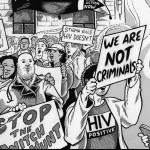People living with HIV access their medications and care in numerous ways, some of which overlap.
Here are the main ones:
Private/job-linked/ACA health plans: You may have a health plan through your job or that of your spouse, or you may have a personal Affordable Care Act (ACA, or Obamacare) plan. In either case, you should know that the federal/state AIDS Drug Assistance Program (ADAP) program for people with HIV usually can (in the case of an Obamacare or other individual plan) cover the premiums and/or co-pays on such a plan if you’re financially eligible. Income thresholds vary by state. Talk to your local AIDS service organization about this and/or call your state ADAP office.
ADAP: Part of the federal Ryan White CARE Act (RWCA), ADAP is the so-called payer of last resort for income-eligible folks with HIV who can’t get HIV meds or care through other private/job insurance and/or Medicaid/Medicare. Up to a third of all Americans with HIV are enrolled in it. ADAP can either connect you directly to HIV-specific meds and care or pay your premiums and co-pays on a plan you’d otherwise have to pay for yourself, like an Obamacare plan. This is often the better choice because then you’ll have comprehensive health coverage rather than coverage for HIV-related services. Use the links above to connect with ADAP in your state.
Medicaid/Medicare: Many folks with HIV have their health needs covered by one or both of these two large federal programs. Medicaid is for low-income folks (income eligibility varies by state), and Medicare is for folks 65 and older or those younger who have a disability. Many folks with HIV are on both programs. ADAP will also often cover out-of-pocket expenses related to Medicare, such as its Advantage plans. Go here to contact your state Medicaid office and here to contact your state Medicare office. You can also ask your local AIDS service organization for help.
Patient assistance programs and health expense charities and foundations: Most drugmakers offer patients assistance in accessing unusually expensive drugs that one’s health plan might not cover or drugs that come with very high co-pays or cost sharing for the patient. Here is a directory of such programs for various HIV drugs, although drugmakers usually help with very expensive non-HIV drugs as well.
Additionally, in rare cases where you can’t have your meds covered through any of the above means, several charities can offer assistance if you meet their eligibility criteria. These include HealthWell Foundation, PAN Foundation, Good Days, Accessia Health, National Organization for Rare Disorders, Needy Meds and The Assistance Fund.







1 Comment
1 Comment